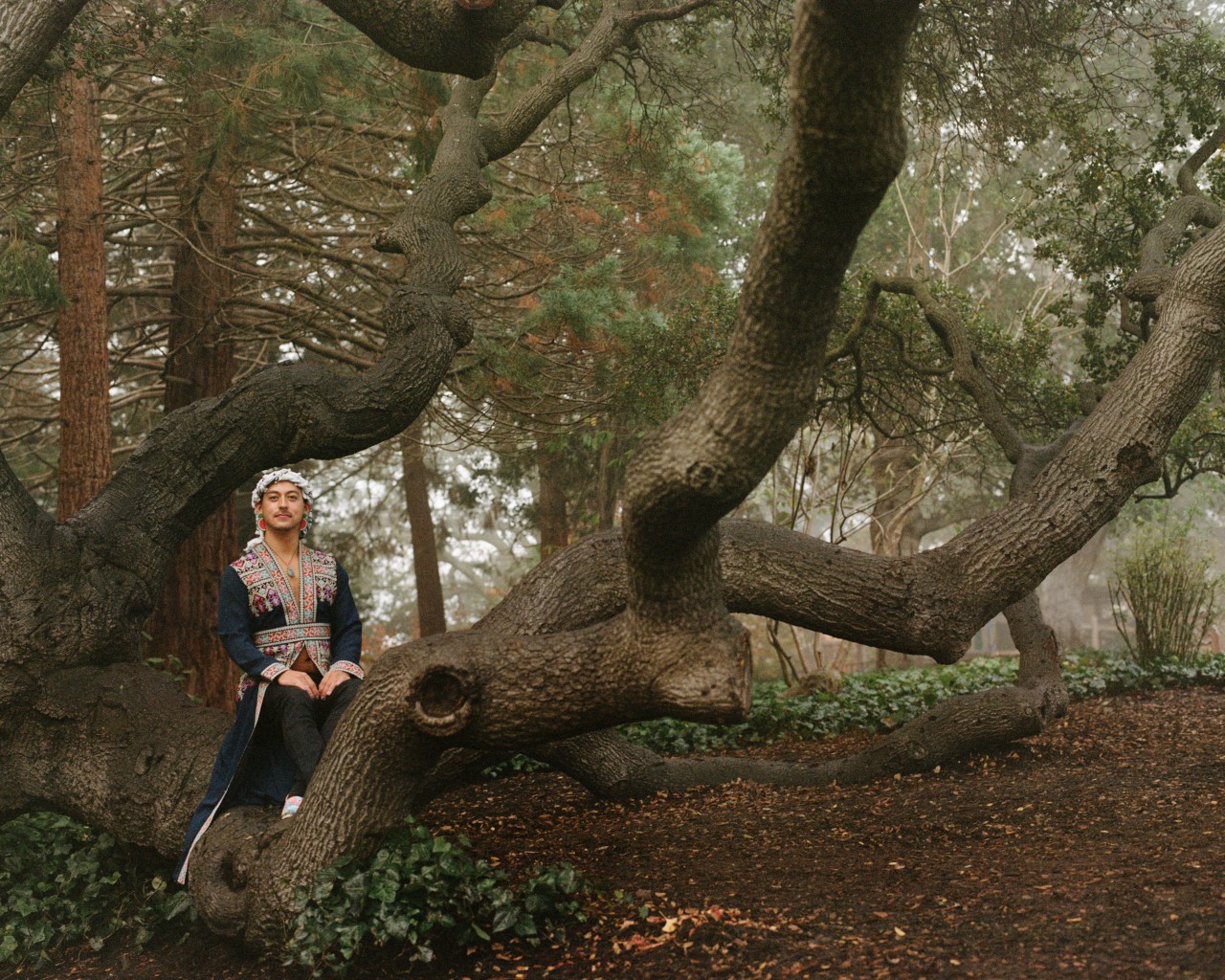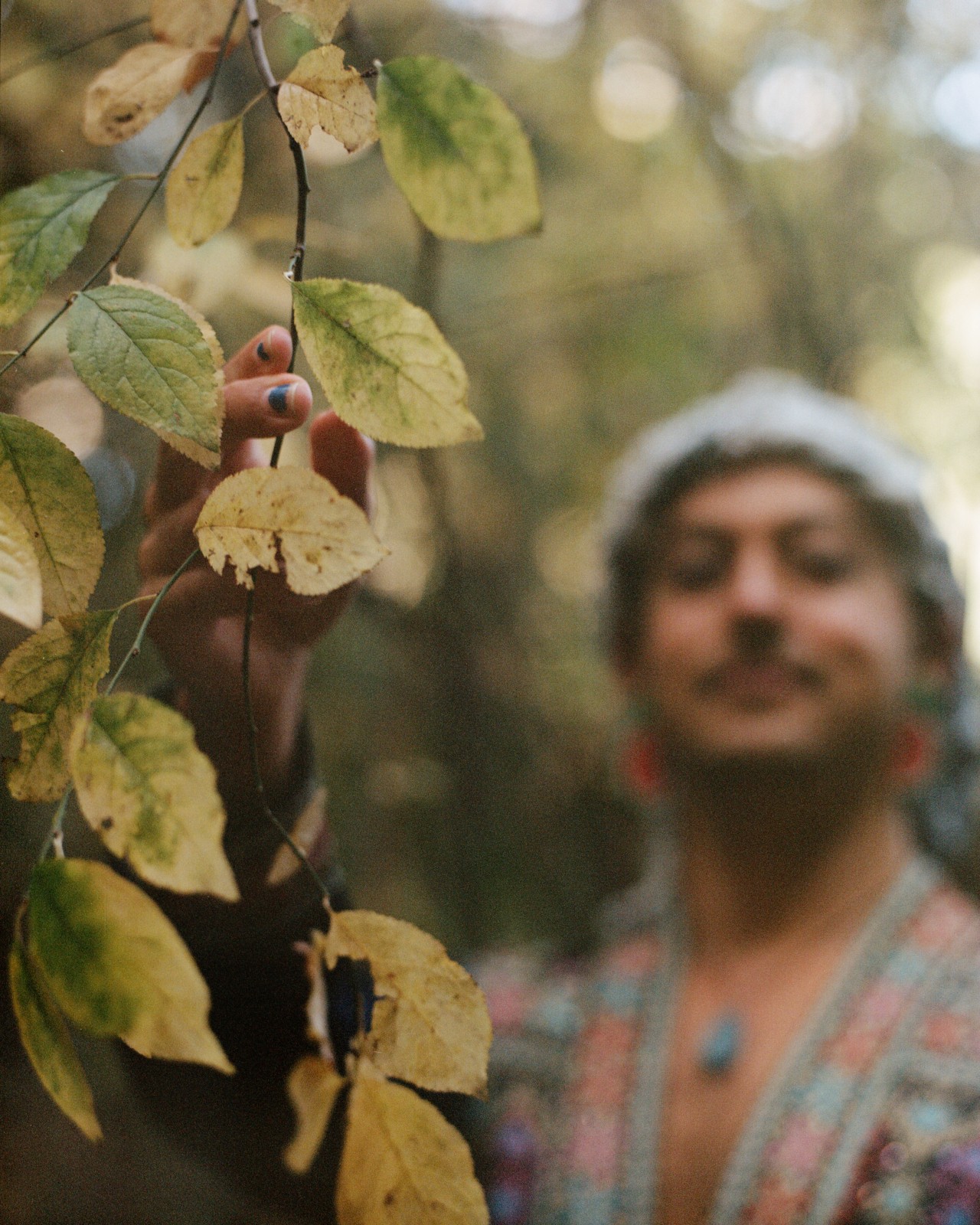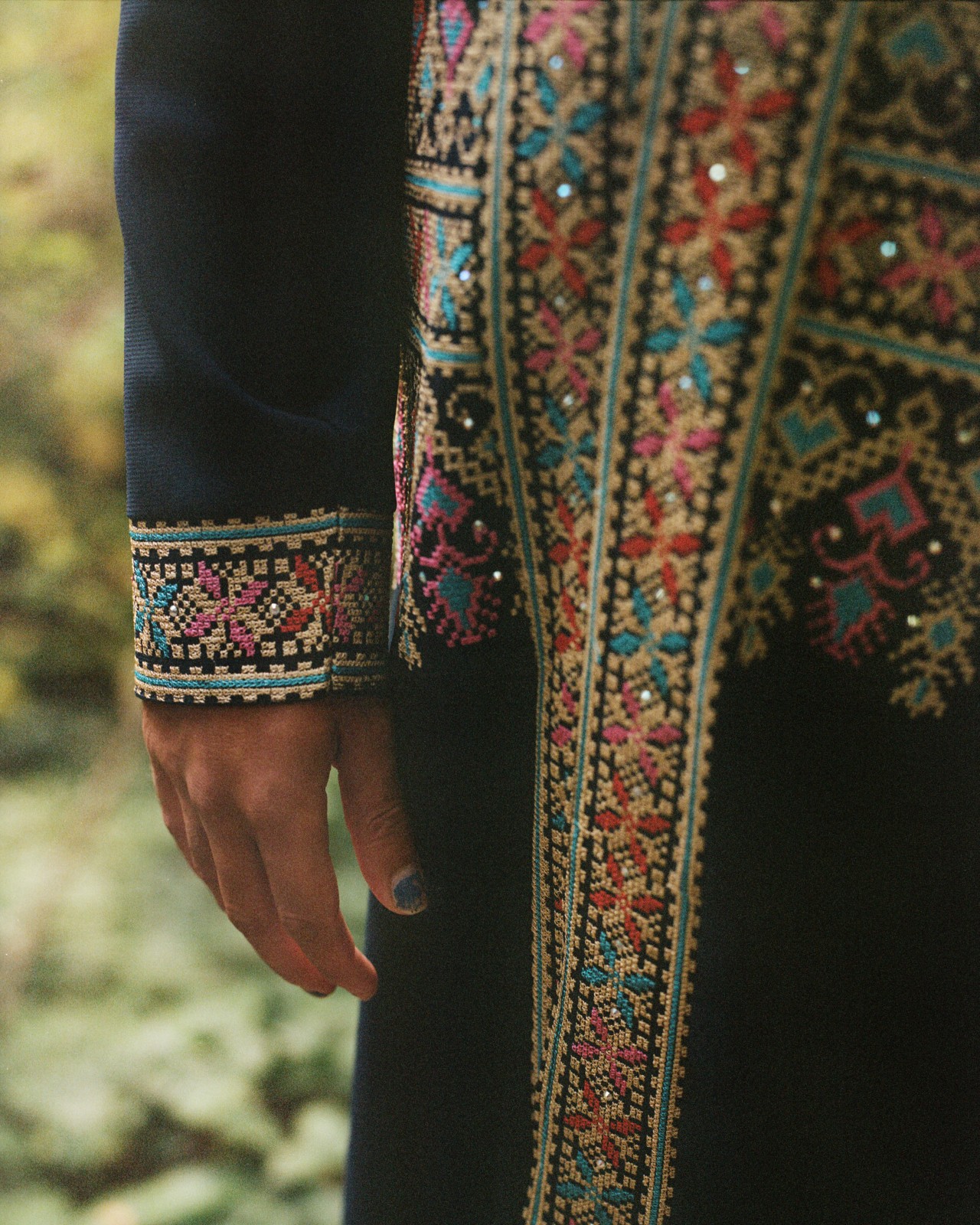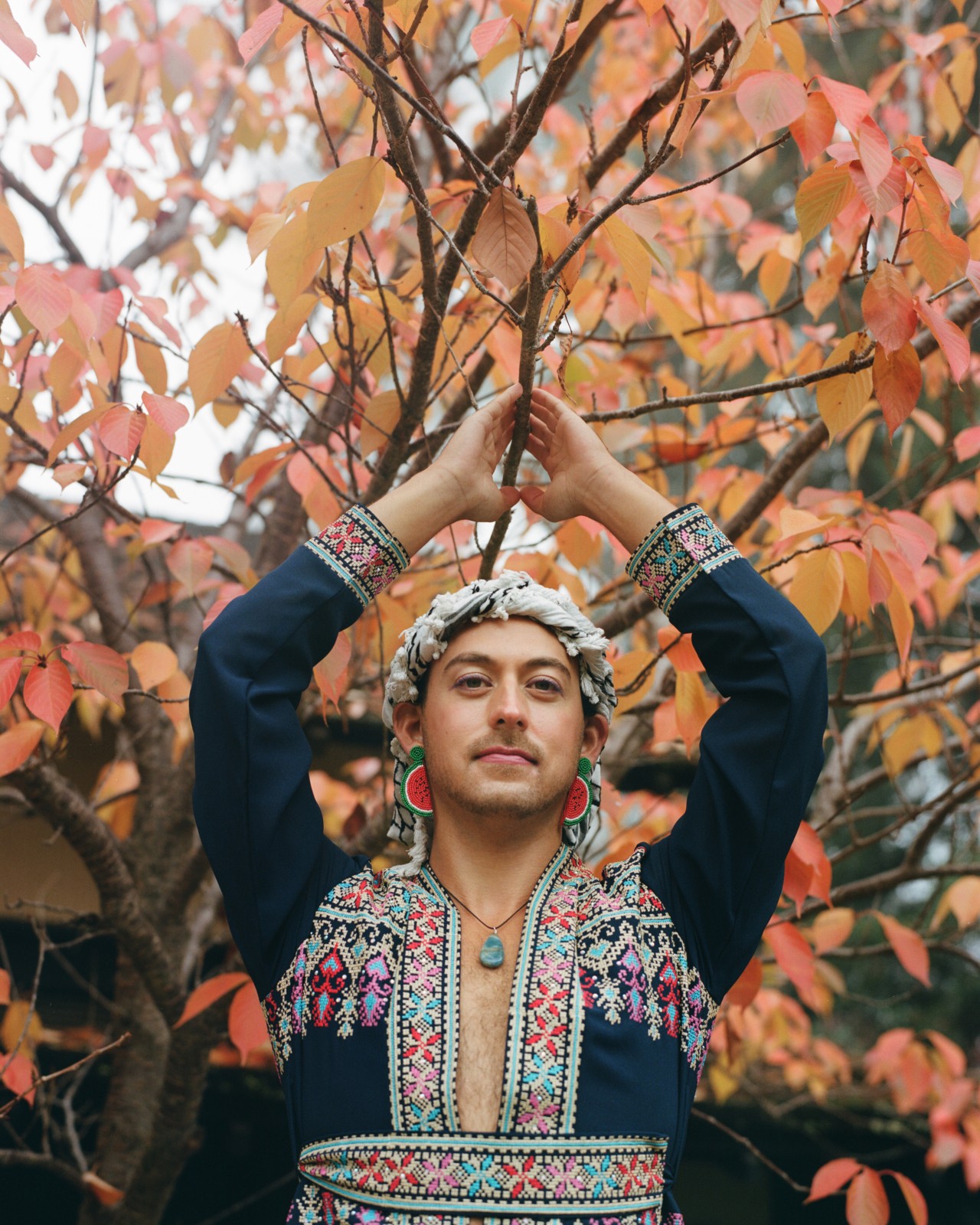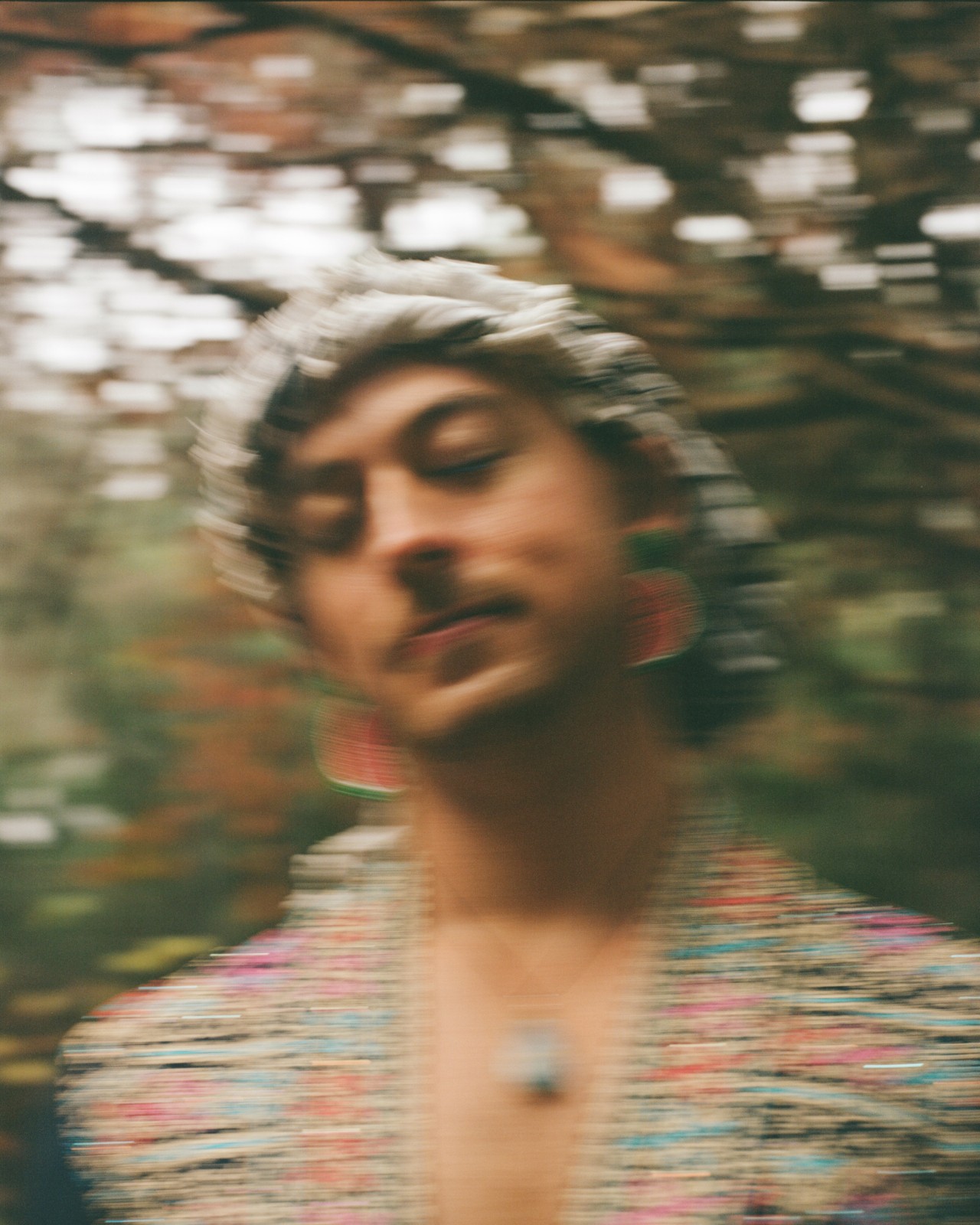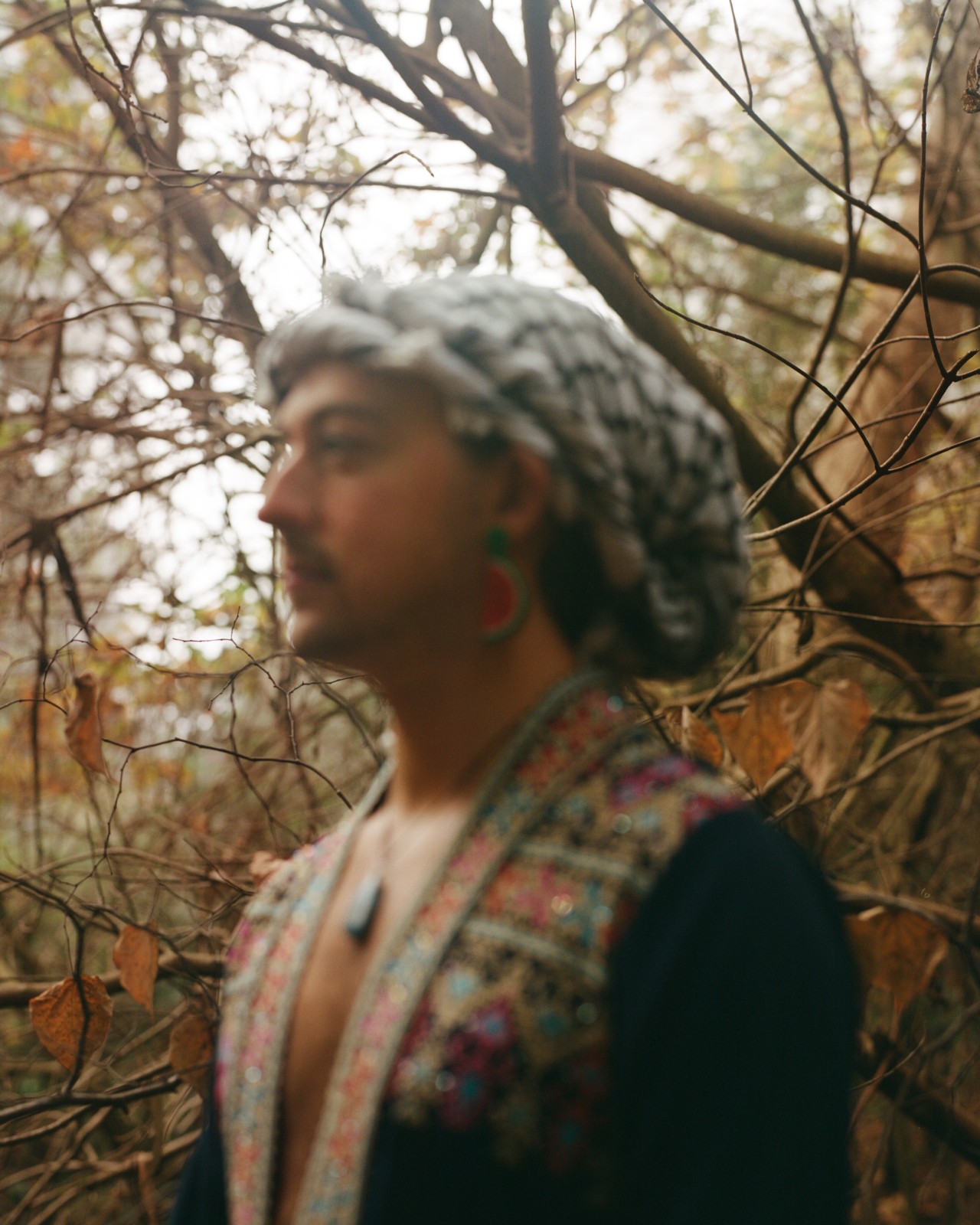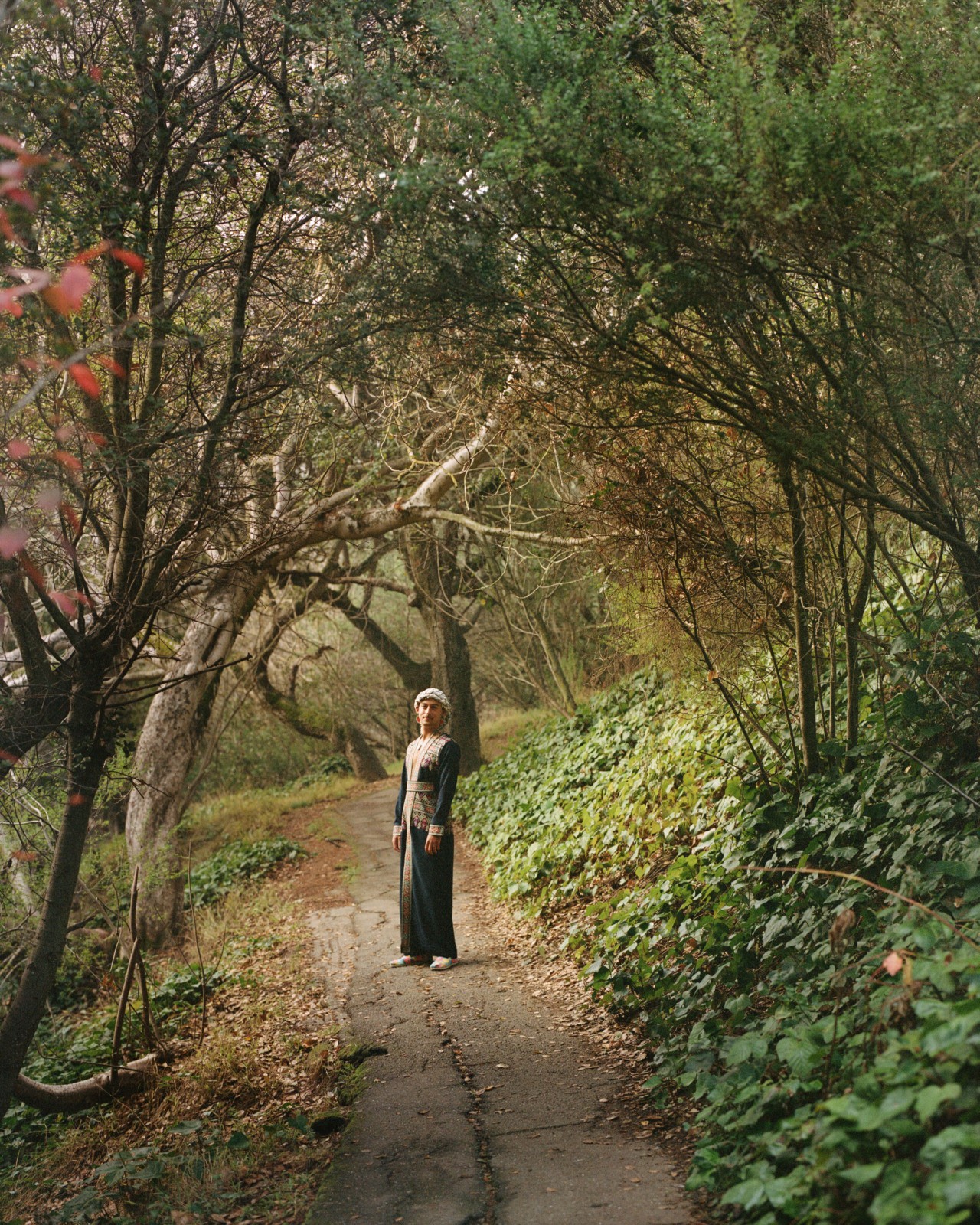

Words by Khaled A.
photographs by María Del Río
At Medicine for Nightmares, a bookstore and community-hub in the heart of the Mission District in San Francisco, Yaffa meticulously spreads copies of their debut poetry collection, Blood Orange, on a stand for their first reading. They have their kufiyya wrapped around their head—the same kufiyya they wore while waiting for the Muni in San Francisco in October earlier this year until a stranger approached them and said: “do you know what [kufiyya] is? I can beat you to a pulp, but a train can do a better job.”
Yaffa is a queer and trans Palestinian poet, teacher, and the executive director of the Muslim Alliance for Sexual and Gender Diversity (MASGD, the Arabic word for mosque). Like many Palestinians protesting the Israeli occupation and its genocide in Gaza and the rest of Palestine, Yaffa’s mere existence and visibility have been threatened, silenced, and terrorized. And that’s where their poetry and writing come in—poetry is a way for them to write back, to immortalize an existence that was the victim of decades of calculated, intentional erasure.
Blood Orange references the oranges of Jaffa, one of the many exploited resources by the British mandate for Palestine, and later, the Israeli occupation. The title protests the portrayal of Palestine as an arid, unpopulated land for anyone’s taking, a false claim shattered by Palestine’s endless olive groves, orange groves, and other forms of flora that has been tended to by lineages of farmers. It is also a reminder of how Israeli violence leaks into every aspect of Palestinian life: the air they breathe, the water they drink, the land they live on. In a poem carrying the collection’s title, Yaffa writes, “our blood filling / trees and canyons / turning the / sea a blood orange / like an eclipse that / forgot to / subside.”
The collection is home to 32 poems, each one written to “yearn for / something that / was supposedly never / mine” and rediscover the home Yaffa was displaced from and never allowed to claim. The collection is also Yaffa’s way to find clarity on why and how they were deprived of this home; to name the violence as they witness it in their life and watch it unfold on their screen. Whether it is tracing their family’s displacement to Kuwait or unpacking the ways queer and trans Muslim lives are used to pinkwash the occupation, Yaffa hopes that Blood Orange will help others make sense of their part in supporting the larger liberation movement.
Below, Yaffa speaks with Atmos about why they write, and how the written word can collectively help us envision a world where every Palestinian and oppressed person isn’t haunted and hunted for generations.

Khaled A.
How are you feeling and doing at the moment?
Yaffa
It’s a lot. In these last few days, so much of what hadn’t hit is finally hitting. One thought that keeps running through my mind is that I don’t know if I have family in Gaza anymore. Most of the family that we have lost, I only know because they released names. We haven’t heard from anybody since. There’s no way to know.
During the last two months I’ve been saying I have family in Gaza. I’m getting to a place where I don’t know if that’s true anymore. Are any of them still alive? I’m exhausted.
Khaled
I keep thinking of the labor that went into making this list just to prove to Western leaders, including Joe Biden, that Israel is killing Palestinians in the thousands. You’ve mentioned that you have family in Palestine, and you’ve also lived and worked in nine different countries. Which ones did you call home, and how did they shape you?
Yaffa
I’ve learned that home is wherever I am. For a really long time, I used to want to try to make these countries home, and try to find different ways of being accepted there. It never worked. I’ve lived in half of them before adulthood, and half of them after adulthood. I navigated some of them with my family, and then others on my own.
I once read a statement that said other countries are only happy when we’re not in Palestine, when we’re outside of it. For me, that’s actually the exact opposite. In all the countries that I’ve lived in, they like the idea of us suffering and dying in Palestine. They don’t actually want us anywhere else. Some of the countries that I’ve lived in are very pro-Palestine, but again, from a distance. I’ll give an example of Ireland, which is incredibly pro-Palestine. But it was impossible for me to stay in Ireland. Their immigration system is worse than the US system.
Having lived in so many places, I really understand how the world—and the commodity of pain—functions. It made me realize whose pain is valued, and whose pain is not valued.
“Having lived in so many places, I really understand how the world—and the commodity of pain—functions. It made me realize whose pain is valued, and whose pain is not valued.”
Khaled
How did that inform your writing?
Yaffa
Writing has always been a way for me to process pain and suffering—usually from society rather than individual experiences.
I completed my first book when I was 13. On paper, that looks really great. “A 13-year-old just wrote a science fiction novel!” But my writing emerged from moving between places, and the displacement and violence I’ve endured from these states and countries. When I was living in Canada, for example, I wrote a book to run away. As I grew older and as I continued writing, it became clear that writing was always about escaping and processing as much pain as possible. Most of my books have been fantasy and sci-fi novels in other realms; in other planets and universes.
My parents were raised in Kuwait and then lived in Jordan. They then moved to all of these places seeking a better opportunity at survival. This instinct of survival is generational—I had dealt with war through my parents and their parents and the generations before them. Now, I’m recognizing the role of art and writing in world-building.
Khaled
Why did you gravitate towards writing as a medium to process pain and displacement?
Yaffa
As I was starting to write, there were things I tried to process but didn’t have words for. I’m a survivor of childhood sexual assault—combine this with the constant moving and learning of new languages—and one of the responses to this trauma was disassociation.
Unfortunately, we don’t talk about these different forms of violence against children. For example, I remember when 9/11 happened. My parents tried to hide it from us, but obviously we found out immediately. We made up stories as a way to make sense of it.
In my early writing, these experiences were translated into fantasy, science-fiction, and art. This “dramatization” made these experiences more tangible to discuss and digest, especially with regards to how they affect us and our identities. As I entered early adulthood, there was no time and space for me to discuss these topics. Writing was where I had space. Anything I couldn’t talk about in real life, anything I didn’t have words for, anything the world wasn’t ready for, I was able to explore in my writing.


Khaled
I was recently having a similar conversation with friends. We initially thought our interest in writing and art-making was because of passion, but it was actually a coping mechanism we developed to navigate and survive the world. I was wondering how channeling grief fits in your other practices—and why you chose poetry to channel this grief at this moment?
Yaffa
As a queer and trans person, it comes as a shock to many that my Muslim practice is so impactful on who I am. I pray five times a day, and I fast. I’m so grateful for the upbringing that I had. I grew up around people from all walks of life. Regardless of my family moving into new places, and facing marginalization as Palestinians living in poverty, we always had space for everyone at our table. They taught me that Islam is all about how you treat other people.
Also, writing is the one place where there is no resistance. Usually, whenever I walk into a room, there’s resistance to my being there. It doesn’t matter how liberal or leftist people are, someone in there is going to have a problem with one thing or another—and it’s usually me.
Writing is the one place resistance doesn’t exist. I get to write anything and everything that comes out of me. Whatever is on my mind and soul. Whatever needs to be released, gets released. It is my way to tell of my life as a Palestinian.
Khaled
You highlighted in your talk that you didn’t grow up talking or naming Palestine. You always approached it from a distance. Was reclaiming writing and poetry your tool to get closer to Palestine?
Yaffa
It wasn’t that they didn’t try to talk about Palestine or that they’d shut down any conversations about it. But there was virtually no time. My mum didn’t have the time to sit us down and tell us how her grandfather and all of her uncles were killed in 1948. She couldn’t tell us that, by the time her dad was 15, all males on that side of the family were killed. Each one of my parents was moving from one job to the next.
Growing up, my dad was a full-time PhD student [in Arizona] and worked full-time at a restaurant. I would basically only see him on the weekends. And on the weekends, my mom was working at Sunday school and giving private lessons throughout the week. I think back to that, and how capitalism in particular impacts even our ability to have conversations within our family structures.
With Palestine, in particular, the hardest part of writing has always been naming Palestine, and centering it in my writing. Though the vast majority of my writing since I was 13 was about looking for home and concepts of belonging, it was always about this yearning for Palestine, for home—but I wasn’t able to name it.
It’s also been a journey to reclaim being Palestinian. In my writing, I would create a world with different systems of oppression, resistance, and ways of being free that mimic the experiences of my people—but I’d situate them in different planets and universes. I would do that without naming Palestine, but always referencing home. It wasn’t until a couple of years ago, when I was doing my master’s thesis about queer and trans Muslim utopia, that I began to envision myself in Yaffa, in a free Palestine.
“Literature is all about world-building. If we can envision it, then it can happen.”
Khaled
One of the tools of oppression is depriving people from imagining a world where tyranny doesn’t exist. You dedicate Blood Orange “to those who dream of better worlds and those who build them.” I kept wondering about the way you position yourself as a world-builder in this collection, and the placement of each poem. For example, why did you start with “Diaspora” before “I Am”, the poem in which you introduce yourself?
Yaffa
Literature is all about world-building. If we can envision it, then it can happen. People forget the world that we live in today has been envisioned before. We often talk about envisioning positive outcomes—we envision utopia. But oppression is also envisioned. That’s what we’re living with now.
With the order of Blood Orange, the reason “Diaspora” comes first—before I mention the movement and the land—is because I want people to know who’s talking about all of this. “Diaspora” shows where I am in that spectrum of experiencing the violence itself. I start the collection with, “being in the diaspora / is having genocide / at your doorstep / and you’re not home to greet it.” The placement is all about the depth of the sorrow and longing. Most of us would rather be there. People think they are dying there, and we are living here. But what is living? I would rather be with my people.
I use diaspora for the first time in this poem. The longest I’ve ever lived somewhere was for six years. I don’t have a childhood home or town. To constantly be in a place without roots is realizing that I could pack up and leave tomorrow if I have to. I’ve always felt the term diaspora wasn’t available to me, compared to people who have lived somewhere [besides Palestine] for more than two generations. But the immensity of the violence and the genocide in Gaza has showed that no one’s roots were real.
Khaled
Throughout the collection, you transcend yourself. You no longer (re)present yourself as the individual Yaffa, but rather as the collective. Can you elaborate on why you chose this approach in the collection when addressing yourself?
Yaffa
I was always raised to believe that humans matter. We’re all part of something larger. When I think of Palestine, it’s not about me going home. I’m not fighting so my feet step onto Yaffa. It’s about everybody’s liberation. It’s about the possibilities, and how you remove the systemic barriers, the apartheid, the injustices, and all of these different forms of marginalization.
In the Global South, we often think about the community rather than just the I within a community. This is not to say that these communities aren’t adopting the values of Western individualism. But there are so many times where people ask if we’d die for a free Palestine, even if we’re never going to see it. And the answer is always yes, absolutely. A lot are shocked by that. They think we’re pursuing this just for ourselves at the moment. If I get to see a free Palestine, that would be great. But I don’t know that. To me, all of these things are so much bigger.
Khaled
This is definitely evident in all of the poems. It also relates to what you said earlier about the spectrum in which you experience this violence.
Yaffa
Exactly. In “Stars”, for example, I highlight how we’re witnessing the same stars that children in Gaza are witnessing. The difference is that our stars are not coming down on us, but their stars are.
Every single person in Gaza is worthy. Most people can’t hold both truths: how a single person’s life is also many lives. You can kill all of us, and you’re still not going to get rid of Palestine. It’ll always be there.

“Most people can’t hold both truths: how a single person’s life is also many lives. You can kill all of us, and you’re still not going to get rid of Palestine. It’ll always be there.”
Khaled
Your description of people’s inability to hold both truths perfectly summarizes the reactions of many queer and trans people in the West. There’s this entitlement and belief that everything needs to revolve around and work for them in order to stand up for something, even if it’s as clear as standing against genocide. They don’t even seem to have the capacity to imagine that people’s lived experiences do and can look different from the stereotypes they’ve imposed on Muslim and Arab queer and trans people. Can you tell me more about why you believe that your healthy relationship with your family as a trans and queer person of color won’t sell in the West?
Yaffa
The broader LGBTQIA+ community often challenges so many queer and trans non-white experiences, especially if you’re an immigrant or a refugee. The vast majority of the violence that I’ve experienced in-person has been in gay spaces, near a gay bar, in the Castro, in San Francisco, and in the West. I use the word gay instead of queer because I recognize that being white and gay is not necessarily the same as being queer. White gay people have an identity that’s seen as “different,” but they do not have to deal with that level of marginalization I experience because of it. We’re not the same.
If their violence and attitude towards us as queer and trans Palestinians is just as bad as non-queer people, then they’re part of the problem. That’s the thing the LGBTQIA+ community needs to reckon with. I get sent messages online like, “Your people would kill you” all the time.
Khaled
What frustrates me is that such comments are not out of care or interest in your well-being. They’re there to remind you that you come from “homophobic, uncivilized” places, while they don’t. They’re used to justify violence and murder of Palestinians at the moment.
Yaffa
The message going out to queer and trans people all around the world is saying that white people are going to save you. That they’re the only ones who can. This dismisses that the biggest threat to us have been these same white saviors. It’s always been them, and it will always be them—because they use that positioning to disguise their crimes against us.
I facilitate a lot of spaces, both within the queer and trans Muslim community and outside of it. I love creating and cultivating spaces of belonging that allow us to go really deep, but in really rejuvenating ways. My priority is always working with the most marginalized. Through the majority of my work, even in Blood Orange, I wanted to fundraise for queer and trans Palestinians and raise awareness about our issues. I specifically wanted this collection to go to queer and trans people who are trying to make sense of their own experiences around it.
The work I try to do is foundation-building work. My priority right now is queer and trans Palestinians, Armenians, Sudanese, Congolese, and Haitians—people who are enduring multiple forms of violence as well as the people who love and support us. I wholeheartedly believe if you create for the most marginalized of the most marginalized, everyone else is included. But if you create for the most privileged, the marginalized are left out.
“I wholeheartedly believe if you create for the most marginalized of the most marginalized, everyone else is included. But if you create for the most privileged, the marginalized are left out.”
Khaled
This is incredibly important work, especially when it comes to creating spaces for us by us. In the context of Palestinians having been historically censored and excluded from telling their own stories, why did you decide to self-publish Blood Orange?
Yaffa
It was such a beautiful and powerful experience. I’m always thinking of how we can build concrete infrastructure to enable change.
I’m going to be launching a queer and trans Muslim publishing house. I have a few anthologies that I want to work on, which center different artists and people. I want us to claim ownership of our words. And do it in a way that’s efficient and timely in a world that’s constantly shifting. I want to hear what queer trans Muslims have to say today. I want us to talk about what’s going to happen in a couple of months. Historically, a lot of publishing houses have put in place barriers to access, like higher education requirements or needing to have the right connections.
Meanwhile, the vast majority of reporters writing about Palestine are white. They know nothing about it. I’m also not going to allow billionaires [who own magazines and publishing houses] to decide who gets to publish what, when, and where. That needs to go. And we have so much power to shift that.
We need to own our stories. We need to own our spaces. We need to own our products. It’s amazing how many people have been following and adhering to the BDS Movement’s demands. I’m also thinking we shouldn’t have to be on Instagram. We shouldn’t have to go to Disney to watch things. We should be creating our own content and uplifting the platforms that support that. There’s so many of us. Once we get together, once we find each other, magical things can happen.


Editor’s Note: This interview has been condensed and edited for purposes of length and clarity.
Palestine as the Compass: How Yaffa Names and Reclaims Home
